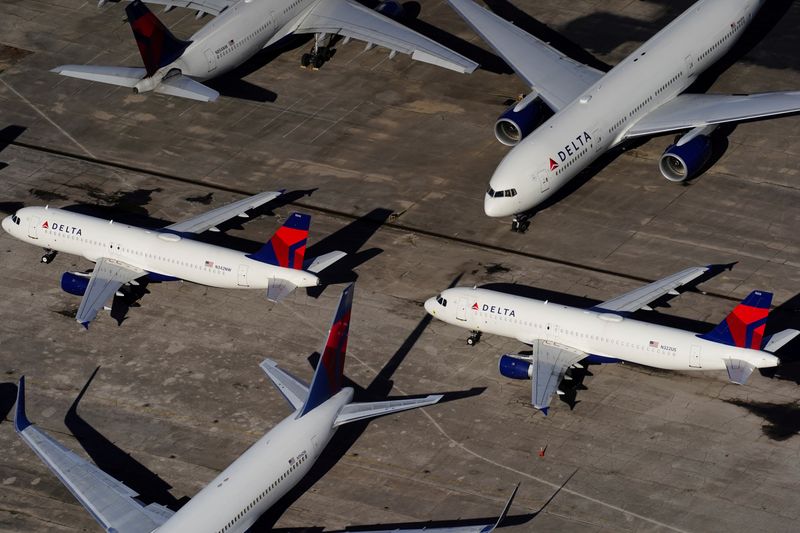By Tracy Rucinski
CHICAGO (Reuters) - Delta Air Lines (N:DAL) expects its third-quarter revenue and flight capacity to be around 20% to 25% of last summer, with demand stalling amid a surge in COVID-19 cases and a sustainable industry recovery more than two years away.
"We're at a stall right now," Chief Executive Ed Bastian said on Tuesday.
Leisure demand that built up over June for travel to places like Las Vegas, Florida or New York has suffered due to fresh infections and quarantines, while growing to some mountain and international destinations.
Business demand will lag by 12 to 18 months as companies await a COVID-19 vaccine before feeling they can safely put employees back on the road, Bastian said, noting the realization that video calls can sometimes be more efficient.
That doesn't mean business travel will disappear, but 2019 volumes may not return at scale.
"The number of trips that the average road warrior takes I'm sure is going to come down in certain cases," he told analysts.
Shares were down 3.1%.
Delta cut the flights it planned to add in August to 500 from 1,000 as outbreaks accelerate.
The pandemic has forced airlines globally to park planes, cut costs and raise capital to stem losses.
Atlanta-based Delta stuck to its target to halt a daily cash burn, which hit $100 million at the start of the crisis but slowed to $27 million in June, this year though Bastian warned it will hinge on demand, which remains choppy and uncertain.
It sees the July burn rate steady at $27 million a day, with improvements as people feel more comfortable traveling.
Delta, the first U.S. airline to report quarterly results, posted a $2.8 billion adjusted net loss, or $4.43 per share, for the second quarter as passenger revenue plummeted 94% during a season that some analysts call the worst in aviation history.
It had $15.7 billion in liquidity at the end of June and has not decided whether to take a $4.6 billion secured loan under the CARES Act as it eyes other financing involving similar collateral.
It already received $5.4 billion in taxpayer funds to cover payroll through September.
Large U.S. airlines have warned of furloughs in October when the stimulus runs out, but Bastian said he hoped to avoid furloughs after more than 17,000 employees opted for buyouts.
Over 45,000 employees have taken varying short-term leaves.
LIMITED SEATING
Delta may continue blocking middle seats beyond September thanks to demand for comfort but warned it cannot make money filling only 60% of its planes.
"You can't raise prices high enough, particularly when your competition isn't blocking middle seats and has a lot more supply out there," Bastian said.
Southwest Airlines (N:LUV) too is limiting seating capacity through September, but rivals American Airlines (O:AAL) and United Airlines (O:UAL) have added thousands of flights with all seats for sale on hopes of picking up leisure summer demand.
Delta is more geared toward business travel, but Bastian said its SkyMiles loyalty data showed business customers traveling for personal reasons and willing to pay a premium.
Delta, which had been expanding aggressively through international partnerships, wrote down $1.1 billion against its recent LATAM Airlines (SN:LTM) investment and $770 million against Grupo AeroMexico (MX:AEROMEX) after their Chapter 11 filings.
It also booked a $200 million charge against its stake in British airline Virgin Atlantic, which on Tuesday agreed to a private-only rescue deal.
